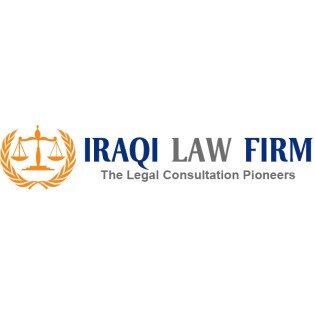Best Tax Lawyers in Iraq
Share your needs with us, get contacted by law firms.
Free. Takes 2 min.
Or refine your search by selecting a city:
List of the best lawyers in Iraq
About Tax Law in Iraq
In Iraq, the tax system is governed by a combination of local tax laws and regulations overseen by the General Commission for Taxes, which operates under the direction of the Ministry of Finance. Taxation in Iraq involves various forms of taxes, including income tax, corporate tax, and indirect taxes such as customs duties and value-added tax (VAT). The system is continually evolving to meet both domestic needs and international standards, aiming to foster economic development while ensuring adequate revenue generation for public projects. Both individuals and businesses are subject to taxation, and navigating the complexities of the tax laws can often require expert guidance.
Why You May Need a Lawyer
There are several situations where individuals and businesses may require the assistance of a lawyer experienced in Iraqi tax law:
- Business Formation and Compliance: Entrepreneurs and companies need to understand the legal tax implications when forming and operating businesses.
- Dispute Resolution: Tax lawyers can assist in resolving disputes with the tax authorities arising from audits or assessments.
- Tax Planning: Individuals and businesses often require strategic planning to optimize their tax positions legally.
- International Transactions: Transactions involving foreign parties can be complex, requiring legal advice to comply with both local and international tax laws.
- Legal Representation: In cases of litigation, having a knowledgeable tax lawyer is crucial for defense.
Local Laws Overview
Understanding the local tax laws is essential for compliance and effective financial planning in Iraq:
- Corporate Tax: Iraqi corporate tax rates apply to both local and foreign companies operating in Iraq, with numerous specific provisions concerning oil and gas sectors.
- Income Tax: Individuals residing in Iraq, or earning income from Iraqi sources, are subject to personal income tax, with varying rates depending on the income levels.
- Indirect Taxes: Includes customs and tariffs on imported goods; there is an ongoing discussion about implementing VAT to diversify revenue.
- Withholding Tax: Withholding taxes apply to certain payments made to non-residents, including dividends, interest, and royalties.
- Double Taxation Agreements: Iraq has a few treaties with other countries to mitigate double taxation issues, crucial for foreign investors.
Frequently Asked Questions
What are the types of taxes in Iraq?
The primary taxes in Iraq include income tax, corporate tax, customs duties, and potentially a value-added tax (VAT) system in the future.
Is there a VAT system in Iraq?
As of now, Iraq does not have a VAT system, but there have been discussions in recent years about implementing one to expand the tax base.
Who is subject to income tax in Iraq?
Both residents of Iraq and non-residents with income sourced from Iraq are subject to income tax on their earnings.
How is corporate tax applied to businesses in Iraq?
Corporate tax is imposed on profits of companies registered or operating in Iraq, with particular provisions for sectors such as oil and gas.
Are there any tax incentives for foreign investors in Iraq?
Yes, Iraq offers several tax incentives to attract foreign investors, particularly in sectors like manufacturing and tourism.
What are the penalties for non-compliance with tax laws in Iraq?
Penalties for non-compliance can include fines, interest charges on unpaid taxes, and potentially more severe legal consequences.
How can businesses optimize their tax liabilities legally in Iraq?
Through strategic tax planning, businesses can leverage available deductions, credits, and incentives to legally minimize their tax liabilities.
What is withholding tax, and when is it applicable in Iraq?
Withholding tax is deducted at source from certain payments to non-residents, including interest and royalties, and it helps ensure tax compliance in cross-border transactions.
Are there opportunities for tax relief in Iraq?
Yes, tax relief opportunities exist through various deductions, exemptions, and incentives provided by the government, especially for certain sectors and activities.
Can I handle tax matters without a lawyer in Iraq?
While some basic filings can be managed independently, complex cases, disputes, or significant financial transactions often require professional legal guidance to ensure compliance and optimize outcomes.
Additional Resources
For those seeking further information or assistance regarding tax laws in Iraq, the following resources and organizations may be helpful:
- General Commission for Taxes: The primary authority for tax regulations and administration in Iraq.
- Ministry of Finance of Iraq: Offers insights into fiscal policies and economic strategies, including taxation.
- Professional Tax Consultants: Licensed firms and professionals that provide specialized tax advice.
- Legal Aid Organizations: Non-profit organizations may offer legal assistance for tax-related issues.
Next Steps
If you find yourself in need of legal assistance regarding tax matters in Iraq, consider the following steps:
- Assess Your Situation: Clearly identify the tax issue or question you are facing.
- Seek Professional Advice: Contact a licensed tax lawyer or consultant experienced in Iraqi tax law.
- Gather Relevant Documentation: Collect all necessary paperwork, such as tax returns, financial statements, and correspondence with tax authorities.
- Schedule a Consultation: Arrange a meeting with a legal professional to discuss your situation and explore available options.
- Consider Legal Representation: Depending on the complexity, formal representation might be required for negotiations or litigation with tax authorities.
Taking these steps can help you effectively manage your tax responsibilities and protect your interests in Iraq's legal environment.
Lawzana helps you find the best lawyers and law firms in Iraq through a curated and pre-screened list of qualified legal professionals. Our platform offers rankings and detailed profiles of attorneys and law firms, allowing you to compare based on practice areas, including Tax, experience, and client feedback.
Each profile includes a description of the firm's areas of practice, client reviews, team members and partners, year of establishment, spoken languages, office locations, contact information, social media presence, and any published articles or resources. Most firms on our platform speak English and are experienced in both local and international legal matters.
Get a quote from top-rated law firms in Iraq — quickly, securely, and without unnecessary hassle.
Disclaimer:
The information provided on this page is for general informational purposes only and does not constitute legal advice. While we strive to ensure the accuracy and relevance of the content, legal information may change over time, and interpretations of the law can vary. You should always consult with a qualified legal professional for advice specific to your situation.
We disclaim all liability for actions taken or not taken based on the content of this page. If you believe any information is incorrect or outdated, please contact us, and we will review and update it where appropriate.
Browse tax law firms by city in Iraq
Refine your search by selecting a city.

















